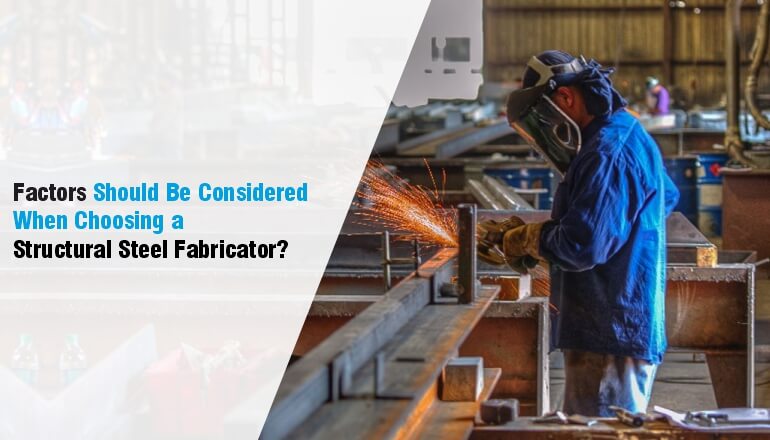Selecting the right structural steel fabricator is imperative in any construction project as it contributes a lot to the success. The cutting and shaping of structural steel to build steel components used in building structures, bridges, and industrial facilities is called structural steel fabrication. How well a structure is fabricated can have a big influence on the overall safety, durability, and performance of a structure.
When choosing a structural steel fabricator you have to take into account a variety of aspects so that you can work with a reputable company in the field of structural steel fabrication.
Tips to Choose the Structural Steel Fabricator
1. Reputation and Expertise:
When researching potential fabricators, you should take into account their experience and reputation in the industry. Always prioritize companies with a proven track record that deliver high-quality projects within budget and within a time frame. Blue Creek Iron Works has served customers with professional steel fabrication services since 2008.
You can also cross-check for client testimonials, references, and reviews to know about the fabricator’s reputation and reliability.
2. Quality Certifications:
Make sure that the fabricator has the proper certifications and credentials required for the fabrication of core steel elements. For example, this would include certifications from industry organizations that set standards of quality and safety in steel construction. Certifications allow fabricators to demonstrate their adherence to industry quality standards and regulatory compliance.
3. Advanced Tech and Equipment:
Analyze the fabricator’s capabilities and their tools for the fabrication of steel. A manufacturer with a good reputation will have the latest machines such as CNC machines, welding equipment, and cutting tools installed to ensure accuracy and efficiency in manufacturing processes. Also, inquire about the capability of the fabricator to undertake jobs of different nature and difficulty levels, and the ability to handle custom-designed components.
4. Quality Control:
Quality control is vital in structural steel fabrication to make sure that all the fabricated components meet design requirements as well as structural standards. Ask the fabricator about their quality control procedures such as material inspection, welding procedures, dimensional accuracy checks, and non-destructive testing methods.
A fabricator with strict quality control processes in place can be expected to provide top-quality products that may even surpass the industry standards.
5. Safety Standards:
There is no substitution for safety in structural steel fabrication. It should be on top of the agenda for every fabricator. Check the accident rate of the fabricator, and verify if they adhere to the safety regimens and practices.
Make sure that the fabricator has up-to-date knowledge about industry safety rules. A fabricator with a strong safety mechanism in place is more likely to prioritize the well-being of their employees and reduce potential risks on the work site.
6. Project Management:
Effective project management and communication are essential for successful collaboration between the fabricator, the client, and other project stakeholders. You need to assess the fabricator’s project management skills, including their ability to create detailed fabrication schedules, coordination with subcontractors, and progress updates to the client.
Clear and timely communication ensures that the project stays on track and any issues are promptly addressed.
7. Budget Considerations:
Although cost is a vital element, price should not be a single factor when it comes to selecting a structural steel fabricator. Rather than simply choosing the cheapest fabricator, focus on the value each fabricator provides in terms of quality, reliability, and expertise. Request thorough quotes from more than one fabricator and compare them based on attributes like pricing transparency, project scope, and services offered. Be cautious of very low bids, because it could mean quality issues or concealed charges.
8. Location and Accessibility:
The location and accessibility of the fabricator can influence logistics and transportation costs, as well as the project execution duration. Choose a fabricator that is near the project site to avoid transportation expenses and simplify the logistical challenges.
You must also consider the fabricator’s proximity to suppliers and other resources, which can optimize the fabrication process and minimize lead times.
9. Sustainability Practices:
Sustainability considerations play a significant role in construction projects. Question the fabricators on their sustainable operations such as the use of recycled materials, energy-saving manufacturing processes, and garbage reduction. Choose a fabricator who is committed to sustainability, aligns with environmental goals, and can also contribute to cost savings and regulatory compliance.
10. Flexibility and Adaptability:
Construction projects are susceptible to alterations that necessitate all stakeholders to adopt flexibility and adaptability. Pick a fabricator who is capable of accommodating changes in project scope, schedule, and design at the time of need. Furthermore, check on the fabricator’s problem-solving skills as well as their willingness to work with the project team to develop strategies and solutions to any problems that may arise.
Final Thoughts
Finally, making the right choice of structural steel fabricator requires taking time to consider various factors such as experience, reputation, certifications, capabilities, quality control measures, safety standards, project management practices, cost considerations, location, sustainability practices, and flexibility.
Through such rigorous assessments, you will be able to select a reliable partner who can provide top-quality fabricated steel components for your building project.


